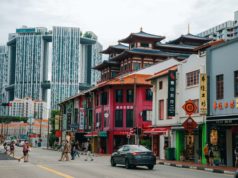ON JUNE 21, 1913, Luis Taruc, son of a corn farmer and fish vendor, a political figure, peasant leader during the agrarian unrest of the 1930s, and leader of the Hukbong Bayan Laban sa Hapon or HUKBALAHAP, was born in Santa Monica, San Luis, Pampanga.
Luis attended primary school at age 8 in a public school in San Miguel, Bulacan. At fifteen, he attended high school in Tarlac City. He attended the University of Manila for two years, studying medicine and law, but no longer able to afford the expenses, returned home without getting a degree to set up a tailor shop with his brother.
As a teen he was inspired by the stories of the Katipuneros who had fought for independence and for agrarian reform against Spain. Certain people within his home village and province came to regard him as the incarnation of the prominent Katipunan leader Felipe Salvador. He was influenced by Pedro Abad Santos, a Marxist, whom Luis regarded as a true socialist. In 1935, Taruc joined the Filipino Socialist Party led by Abad Santos in 1935.
In 1941, right after the Japanese invasion, Taruc joined the groups of Communist guerrillas operating in central Luzon led by Crisanto Evangelista. After the capture and execution of Evangelista and other prominent guerrilla leaders (January-March 1942), Taruc brought together all these groups of resistance under the name of HUKBALAHAP or Huk. Following a week-long organizing conference, the newly formed Huk organization selected four of their leaders (Castro Alejandrino, Felipa Culala, Bernardo Poblete, and Luis Taruc) to become the Huk Military Committee. The Military Committee was at the apex of Huk structure and was charged to direct the guerrilla campaign and to lead the revolution that would seize power after the war. Luis Taruc was elected to head the committee, and became the first Huk commander, “El Supremo”.
Under his leadership the Huks became the most important strength of armed resistance against the Japanese occupiers, organized in autonomous squads who practiced an effective fight guerrillas, taking advantage of the knowledge of the land.
In 1946, Taruc was elected to the Philippine House of Representatives as a member of the Democratic Alliance, led by Sergio Osmena. He and five other elected Democratic Alliance candidates opposed the constitutional amendment that would give American businessmen parity rights with Filipinos in exchange for US rehabilitation funding. In particular, Luis opposed the Bell Trade Act, the Parity Amendment to the Constitution, and the Military Bases Agreement. To secure the majority necessary to pass the amendment, President Manuel Roxas arranged for Taruc and the other oppositional Democratic Alliance members ejected from office by the Commission on Elections on grounds that they committed election fraud and terrorism.
Taruc went underground in late 1946, following failed negotiations with President Roxas, and the Huks soon numbered 10,000 armed fighters.
Subsequent negotiations with President Elpidio Quirino in June and August 1948 also failed. By the presidential elections of 1949, the Huks had abandoned electoral politics in favor of armed insurgency.
The Huks controlled most of central Luzon, the “rice basket” of the Philippines, including two provincial capitals, by 1950. Their motto, “a democratic peace, or martyrdom”. In the Politburo meeting of December 1949 to January 1950, the Huks were reorganized as the HMB, “Hukbo Mapagpalaya ng Bayan”, or “People’s Army of Liberation”, with Luis as a Politburo Supervisor (PBS) for the Party’s Regional Committee, in the Zambales Mountains.
By November 1950, Luis was removed from his post of command entirely. By then, the Huks had 15,000 armed men, and the country was embroiled in a “miniature civil war”, with ambushes on the major highways common.
President Quirino assigned Ramon Magsaysay, minister of national defense, to combat the Huk insurgency. On October 18, 1950, Magsaysay captured the Secretariat, including the general secretary Jose Lava, following the earlier capture of the Politburo in Manila. Magsaysay attracted peasant support by reforming the Army and Constabulary. After the 1951 Central Committee meeting, a policy of “preservation and conservation of strength…for a long and bitter struggle” was adopted, and Luis departed with a group of ninety men and seven women, for the Sierra Madre Mountains. The latter part of 1952 was spent hiding in the Mount Arayat area.
In January 1953, Luis was suspended from the Politburo and Secretariat for his “Call for Peace”. On 10 February 1954, Manuel Manahan and Benigno Aquino, Jr., appointed as President Ramon Magsaysay’s representatives, met with Luis Taruc. After four months of negotiations, Taruc surrendered unconditionally to the government on May 17, 1954, effectively ending the Huk rebellion.
On June 15, 1954, Luis met with President Magsaysay and General Eulogio Balao at Camp Murphy, where Luis agreed to a trial.
Taruc’s trial started in August 1954. He pleaded guilty to rebellion, “in the spirit of my agreement with the president”, and sentenced to 12 years of imprisonment, plus as “huge fine”. From 1956 to 1958, Luis was again put on trial for the execution of Feliciano Gardiner, Japanese occupation governor of Tarlac, for which he was found guilty and sentenced to four life sentences. His petition to President Diosdado Macapagal for executive clemency and amnesty to political prisoners in exchange for support for the President’s social welfare program was ignored.
Taruc was later pardoned by President Ferdinand E. Marcos on September 11, 1968. After his release, he continued to work for Agrarian reforms. His struggle on behalf of the poor farmers persuaded local and national leaders to strengthen the legal rights of farm workers and led to a more equitable distribution of farm land.
In his later year’s Taruc claimed to have never been a real communist, but rather always advocated Christian democratic socialism; he supported land reform strengthening the rights of local, small farmers over corporations and hereditary feudal elite.
Luis Taruc died of a heart attack on May 4, 2005 in St. Luke’s Medical Center in Quezon City at the age of 91. Many political figures went to Luis Taruc’s wake to pay respect and give support to his family.





